|
IT'S GOOD FOR BUSINESS
Metal Slug Advance - oxymoron, or what?
Alert readers will already know of World Of Stuart's disillusionment with the once-glorious Metal Slug series. The breath of fresh air the first game represented grew staler and staler as SNK and then Playmore milked the franchise dry with a line of cash-sucking games that got less and less fun with each coin-op iteration.
But the home versions of the Slug games have always kept a little flicker of hope alive. Freed from the need of having to keep players pumping in more coins every 30 seconds, the console ports have been a lot more worthwhile, from the PS1 release of Metal Slug X with its mini-missions and single-life endurance mode, to the two inventive and different Neo Geo Pocket versions, to the neat "Storming The Mothership" and "Fat Island" bonus games added to the Xbox port of MS3. So it was with cautious optimism that your reporter approached the latest in-home Metal Slug, an all-new MS for the GBA. And, for once, your oft-disappointed correspondent's optimism was rewarded.
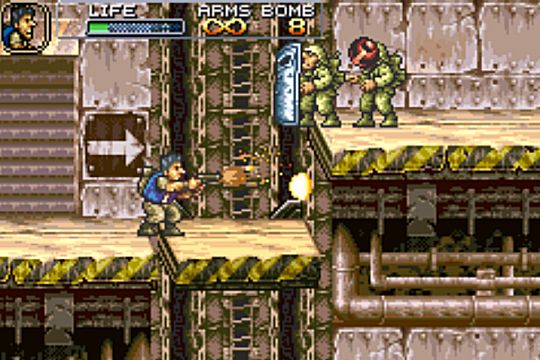
That shield bloke's in for a nasty shock if he turns round.
While at first glance MSA looks like your everyday bog-standard Metal Slug, it's actually a completely different little beastie, so let's jump straight in and explain the major changes, two of which WoS's most eagle-eyed viewers may have spotted from the screenshot above. In Metal Slug Advance there is no scoring, and you have a life bar. Your reporter will pause here for a moment while readers have a nice sit down and catch their breath.
The reason for these alterations, which at first appear to fly in the face of what Metal Slug has always been about, is that this is not an arcade game. MSA is only superficially a platforms-and-shooting game - in structure, it's more like Pokemon. The challenge is no longer to get to the end, or to amass the highest possible score with one credit. You can actually "complete" the game in about two hours or even less, but it's possible to finish it - that is, to see the end credits - with, effectively, a score of 0%. You might at this point be wondering "Whuh?", so it's lucky that the whole thing's going to be explained immediately following the screenshot below.
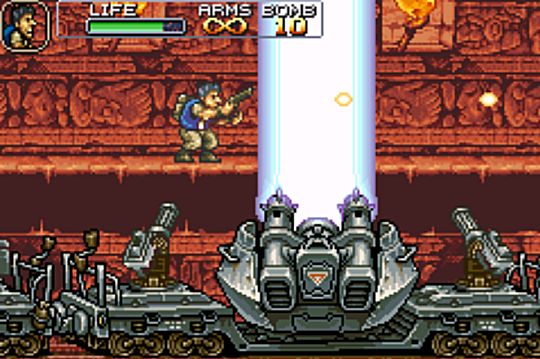
Concentrating on shooting an annoying wasp, Walter missed the more dangerous target.
MSA comprises five main stages, each divided into several short sections. When you die (normally three hits on your life bar, but different things do differing amounts of damage), you can continue from the start of the section you were in. However, if you quit back to the menu and then restart, you can only resume from the beginning of a stage. There's a reason for this, and it's the core gameplay mechanic of Metal Slug Advance.
As is traditional, as you progress through the stages you can free captured prisoners, who reward you with powerups or bonus items. The first time you collect a particular bonus item, the game will pause and tell you you've collected that item's "card". From the menu screen you can keep track (via two Pokedex-type albums) of the prisoners you've freed, and the cards you've collected. But here's the twist - things only get saved into the albums if you keep them all the way through a stage without dying. If you beat a stage by using continues, you only get to keep the things you collected with the credit you used to reach the end - every time you die, you lose everything you'd collected with that credit.
There are no prisoners or items in the "boss" sections. Therefore it's possible, if you use continues on every stage, to get to the end of the game without having saved a single prisoner or card into your albums. And since filling the albums is the true goal of MSA, that means you'd have finished the game with a score of 0%. Novel, yes?
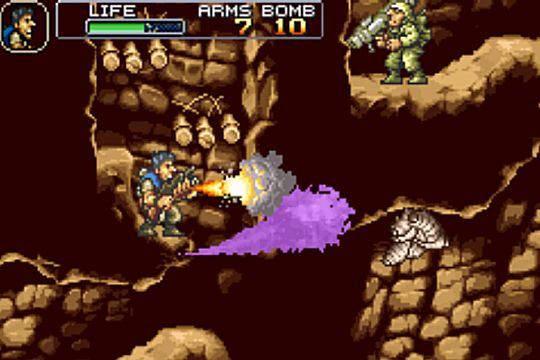
Don't panic - despite the purple smoke, there are NO ZOMBIE BITS in Metal Slug Advance.
The structure of MSA is a stroke of genius. It opens the game up to be played on a number of levels, and is the antithesis of so many modern games which demand hours of effort to "unlock" large chunks of what people have already paid good money for. If you're a bit rubbish, or don't care about beating the game "properly", you can still get to see all the stages without too much trouble. If you want a simple challenge, you can still try to get to the end with a certain number of credits, or against a time limit or something. (WoS estimates that it'd be possible, going as fast as you could, to get right through from start to end in maybe 30-40 minutes.) But if you want to take on MSA on its own terms, like a man, you'll find huge amounts of replay value in here.
There are, as you might expect, lots of hidden secrets in the game, and a variety of routes to take at several points. It's not possible (at least, I don't think so) to collect every item in a single game, so you'll have to go back and play each stage several times. Thankfully, though, unlike previous games, you can start on any stage you've reached. This consideration for the player's enjoyment is typical of Metal Slug Advance, and what was so sorely missed in the last few iterations of the arcade game. Once again, as with so many of this year's great releases, you really get the feeling the developers actually want you to enjoy playing their game, rather than just putting you through a gruelling task for grudging rewards.
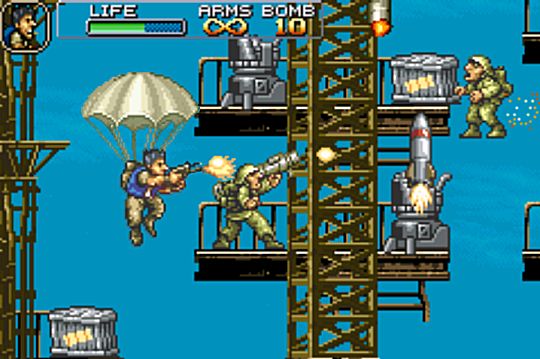
Confusion reigned as Tarquin (top right) forgot his parachute.
So much for the structure, then. Content-wise, MSA pretty much is Metal Slug business as usual. All your old pals are back, with the familiar array of tanks, helicopters and giant armoured train things to contend with. (For your own part you get to drive a tank and fly a plane, and in a neat feature borrowed from the Neo Geo Pocket games, getting your plane shot down results in parachuting out and having to deal with a whole new section of the game, rather than just blowing up and dying.)
Pleasingly, though, the most annoying traditional aspects of MS games - most especially, those teeth-grindingly awful sections where you turn into a zombie, mummy or fat bloke and are suddenly reduced to the speed of a drunk rhinoceros swimming through tepid glue - have been excised this time around, leaving the game fast, lean and mean. The bosses have also been toned down considerably from the tedious, stupidly hard ones of the coin-ops, where killing the boss would take longer than the entire rest of the stage, and the player would lose as many lives through sheer boredom as from the ferocity of the attacks.
There are no such pacing problems here. MSA moves like lightning, and the speedy respawning of killed enemies means you can't afford to hang around. It's frantic, all-action stuff from start to end, and you'll want to take advantage of the considerate option offered to have your gun auto-fire when you hold the button down. (GBA games requiring rapid manual fire are a real pain, as the constant hammering inevitably makes the screen shake around and can leave the player horribly queasy.)
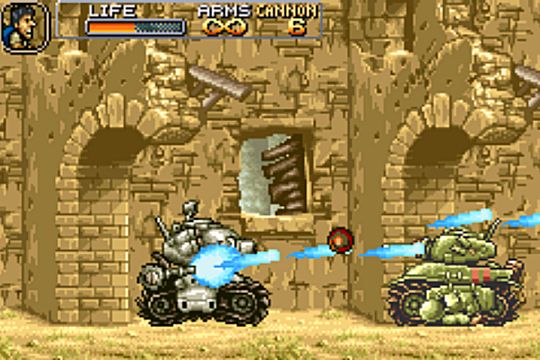
Tanks indoors - a recipe for disaster.
Now, at this point, viewers, your reporter has to confess to incomplete knowledge. Having played through to the end credits in both "Normal" and "Hard" modes, using both of the selectable characters (between whom there's no discernible in-game difference, incidentally), and collected some but not all of the prisoners and items in his albums, your correspondent didn't notice any new game elements being offered.
However, the "prisoners" album has slots for captives freed not only from the game's five normal stages, but also in an area listed as "Dungeon". This area, wherever it may be, apparently accounts for 25 of the 100 prisoners you have to rescue to properly complete the game (the other 75 are distributed equally between the five main stages, 15 prisoners in each), so it's clearly a fairly significant section. It has, thus far, nevertheless evaded this reviewer's attempts to locate it.
(The problem with being the first site anywhere on TV's famous The Internet with a review of the game, of course, is that you can't crib the info from anywhere else. Gah.)
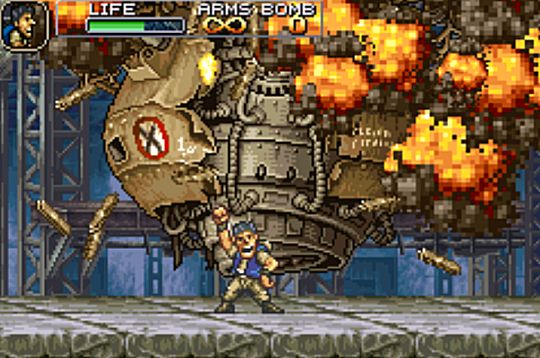
Destruction of the enemy was celebrated with an impromptu performance of "Staying Alive". But the truth of the matter is that even before considering what delights might lurk in the "Dungeon", your reporter is confidently able to affirm that Metal Slug Advance is a credit to the GBA, and a little teeny slice of handheld joy. It's been designed with the hardware in mind and it shows. It's suited to both extended sessions and quick five-minute explores while you're waiting for your bus - the stages are short enough to blast through one looking for new secret areas and items and rescuing a couple more soldiers in the time it takes to read all the interesting bits in a copy of NME. It's difficult in all the right ways - it always seems to be your co-ordination that lets you down, not a ridiculous onslaught of enemies that you simply don't have the firepower to cope with - so even though a moderately skilled player can see the "end" the same day they buy it, the challenge will last a long time, and more importantly you won't stop enjoying it before then.
Viewers sensible enough to own some manner of GBA flash-cart will already have installed their copies of Advance Wars, Wario Ware, Lode Runner, Mr Driller 2, Kururin Paradise and Chu Chu Rocket onto it. (Because hey, nobody wants to have pocketfuls of loose carts spoiling the line of their trousers, do they?) Now there's something else you might want to load onto it before you superglue it into the machine forever.
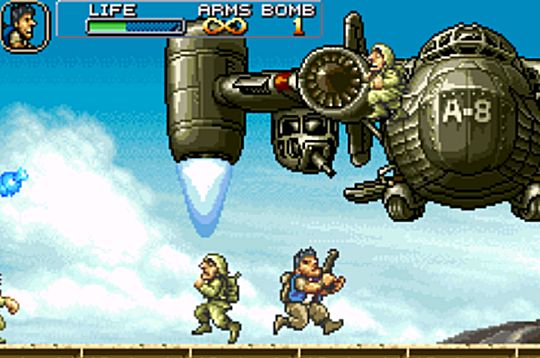
Our hero's reputation precedes him.
|

